Pear Shaped Diamonds, in-trade buying tips.
10 June 2024
6/9/2024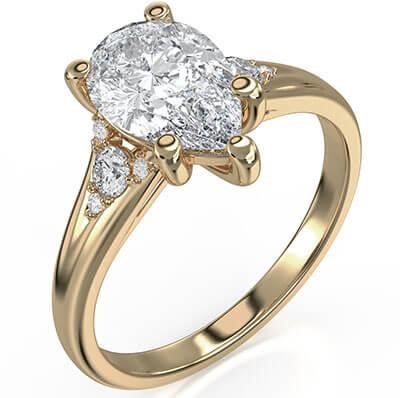
An example of a beautiful, 1.50 carat pear shaped diamond ring.
The pear shaped diamond combines the marquise and round cut diamond, giving buyers the best of both worlds. This shape reminds wearers of a teardrop or water drop, invoking deep emotions every time the diamond is viewed. Elegant and refined, pear shaped diamonds are a classy choice for engagement rings, though they’re also used in earrings and necklaces.
This article shares best practices and in-trade tips for choosing your own pear shaped diamond and how you can save money in the process. You’ll learn what to avoid and what to search for in a high-quality Pear diamond. In short, this post will teach you to weed out any outliers and hone in on the diamond of your dreams. Aside from that, we’ll discover the best ring settings that make any pear shaped diamond shine.
Let’s get to it....
What Are Pear Shaped Diamonds? Let’s Find Out…
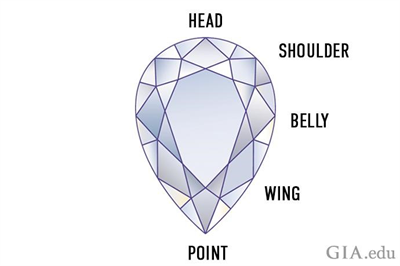
The inner workings of a pear shaped diamond. image: GIA.edu
Pear shaped diamonds date back to the 1400s and were designed by diamond cutter Lodewyk Van Berquem. This elegant shape quickly became a popular choice for buyers hoping to look like royalty. Men often purchased this cut to give their wives something different than the standard round-cut diamond. The pear shaped diamond was part of a diamond surge when diamonds became accessible to more buyers.
Many famous gemstones bear the likeness of the pear shaped diamond. The Star of South Africa, Star of the Season, and the Millennium Star, to name a few, all fall under this category.
And that’s just a few! Throughout the years, pear shaped diamonds have continued to make diamond enthusiasts breathless. With a combination of elegance and uniqueness, these diamonds will stay relevant for years to come.
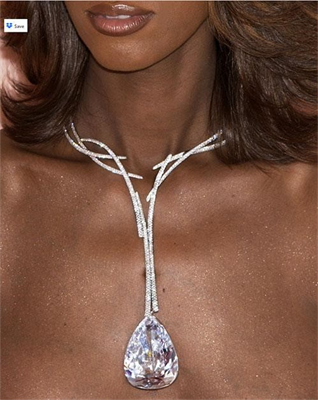
This photo depicts the De Beers Millennium Star, graded D-Flawless by GIA,
This diamond is among the largest in the world, with the original weighing
over 700 carats. It took 3 years to shape this gem!
Pear cut diamonds usually consist of 56 facets, though that can vary based on the facet patterning. Remember that each diamond is different, and pear shaped diamonds have a lot of room for interpretation. Because of their carat weight, pear shaped diamonds tend to look larger than they are. These diamonds appeal to those who want more bang for their buck. They’re also an excellent choice for buyers who wish to stand out from the crowd.
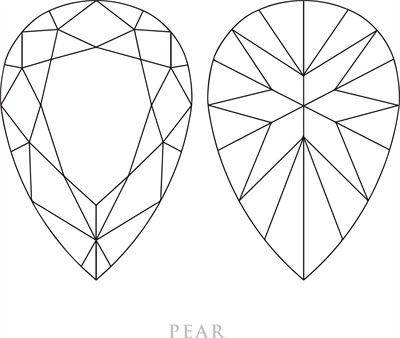
Pear Shape Diamond facets diagram The Best Pear-Shaped Diamond Proportions
GIA doesn’t give pear-shaped diamonds a distinct shape grade, making shopping a puzzle for inexperienced diamond enthusiasts. Plus, the majority of diamonds on the market are shaped poorly, adding to the confusion. Diamond buyers need to be able to accurately judge a diamond based on more than a grading report. They need to be savvy enough not to be tricked by any diamond seller, which is what this article aims to do - educate.
This table of proportions is a great starting point for those looking to avoid poorly shaped diamonds. While it’s not a comprehensive guide, it’s certainly enough to help you narrow your choices and eliminate the competition.
|
Excellent
|
Very Good
|
|
|
Table %
|
56% – 62%
|
54% – 65%
|
|
|
Depth %
|
58% – 64%
|
56% – 67%
|
|
|
Polish/Symmetry
|
Excellent – Very Good |
|
|
Length to Width
|
1.50 – 1.60
|
1.40 – 1.60
|
|
|
Girdle Thickness
|
Thin – Thick very Thin-Very Thick
|
|
|
Culet Size
|
None
|
Very Small
|
|
|
* Note: Use this table as a guideline, not a firm rule.
Keep in mind that you can’t judge a diamond based on numbers alone. Many factors contribute to an accurate assessment, so look into ASET and other resources to get a full picture of the gem. Be sure to ask your retailer for all available resources to make an accurate decision.
From what I can tell, pear shaped diamonds are at their best when they have a depth ratio of 57-63% and a table size of 55-65%. The girdle of a pear shaped diamond will be thicker near the tip, and that is perfectly fine. In fact, a thicker girdle gives the diamond strength, reducing the chances of chipping elongating your gemstone’s life..
Need a real-life example of what a well-shaped pear diamond should look like? Look at the photo below.
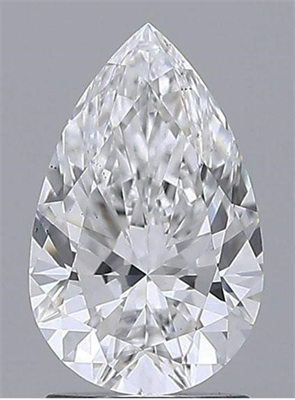
This photo shows what’s considered to be a perfectly portioned 1.91 D VVS2 carat pear
shaped diamond by Diamonds-usa.com, 1:1.58 length to width ratio. Keep in
mind that the best way to purchase a diamond is to examine it in a video.
What is the Ideal Pear Shaped Diamond Length to Width Ratio?
Everyone knows the length to width ratio can impact the diamond’s appearance. Length to width ratio is strictly personal preference. This reference picture gives you an example of how different ratios can affect a diamond’s look. These ratios are best-sellers and vastly preferred by diamond buyers. For reference, the ideal length-to-width ratio of a pear shaped diamond can be 1.60 to 1.70 ratios, which is my preference, too.
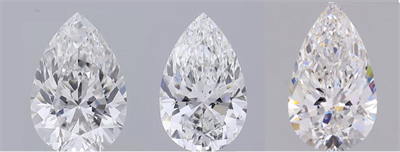
From left to right, Three Pear shape ratios, 1.50:1, 1.60:1, 1.67:1
Gems with a length to width ratio of 1.55-1.60 are another favorite of mine. Many find the larger pears more appealing than those that skimp in measurement. Beware, though. The gem appears deformed if a length to width ratio is too high.
As previously stated, your personal preference is priority when considering a diamond’s l/w ratio. Some prefer thinner, more “malnourished” stones or those that appear heartier. Ultimately, the gem’s shape must delight you and no one else.
How Do I Wear a Pear Shaped Diamond Engagement Ring?
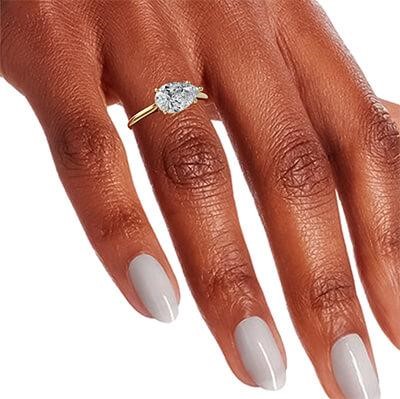
Photo depicts a sideways pear shaped diamond, which is
considered unique. Ring image:Diamonds-USA.com
How do you wear a pear shaped diamond engagement ring? The answer lies with you. It all boils down to you and your partner’s personal preference.
Traditionally, pear shaped diamond engagement rings feature the tip of the gem pointed down. This ring style slims the fingers and is a popular option for women who value appearance.
Some prefer to have their diamonds pointed towards them, which is also a great option. At the end of the day, it’s your engagement ring, and you deserve the jewelry of your dreams.
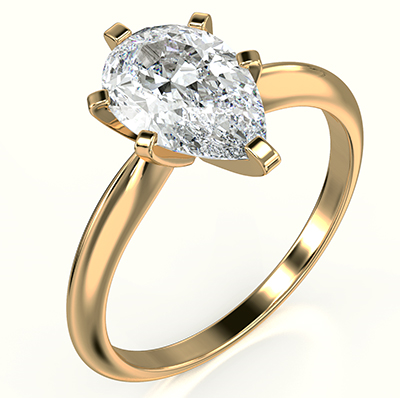
Photo depicts a classic 6-prong pear diamond ring setting.
I can’t emphasize this enough: grading reports alone aren’t enough to help you make an educated purchase decision.
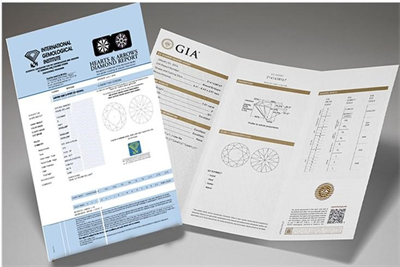
Here are some samples of IGI and GIA diamond certificates
Here’s why: Grading certificates give you physical measurements, but they can’t show you what the diamond looks like. This is why you should always request a video of a diamond, especially if you’re purchasing one online. Most diamond sellers will offer a 360-degree video to ensure transparency between the seller and buyer.
Buyers Beware: Pear Shaped Diamond Outlines to Avoid!!
That being said, you need to avoid certain types of appearances when purchasing a pear shaped diamond. I’ve gathered (with help from GIA.EDU) examples of pear diamonds with unsavory outlines.
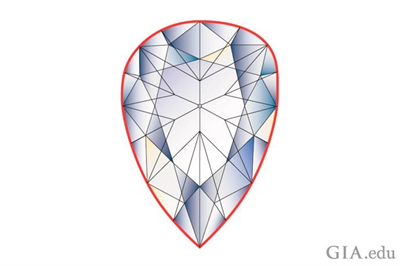
It’s easy to see that this pear shaped diamond is not symmetrical
in it’s shoulders length and width. Avoid a shapes like this!! Illustration: GIA
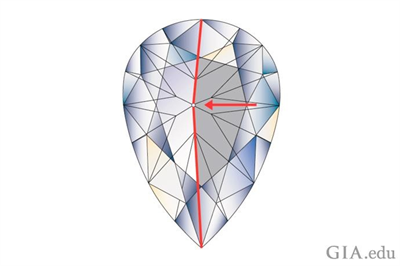
At first glance, this diamond appears alright, but when you look closely, you’ll see the cutlet is ajar. Cutlets should always be placed at the same distance from either side of the gemstone. Otherwise, your brilliance is off. Illustration: GIA
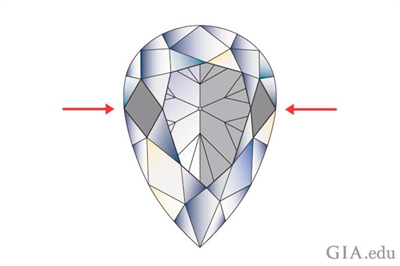
This picture depicts an off-center table, where the crown facets appear larger on one side than the other. This can affect the overall appearance of the diamond and reduce the “shine” factor. Illustration: GIA
Diamonds-USA provides online videos that allow you to judge your pear-shaped diamond accurately. To use, click and drag the camera to view the diamond’s outline, cutlet, and symmetry.
Color Grade Recommendations for Pear Shaped Diamonds
Marquise and pear shaped diamonds have more color in their points than round cut and other shaped diamonds. The color often gathers near the tip of the gem due to light reflections in that area.
If you prefer your diamond to look white once mounted on its selling, go with a G or higher color grade.
If you prefer vintage styles and yellow gold settings, you can get away with a lower rating like J or K. In either instance, avoid L grades, which appear “dirty” in this diamond cut.

Clarity Ratings for Pear Shaped Diamonds
Pear shaped diamonds are forgiving and often conceal any inclusions. This is great news for frugal buyers, who can get away with lower clarity ranges, like SI1 and even SI2.
Of course, everyone is comfortable with different clarity levels. If you prefer high-clarity diamonds, you’re not wrong… especially if you don’t mind paying the higher price for these gemstones.
As a practical person, I recommend a minimum clarity grade of SI1 or a high range of SI2. As long as the diamond looks clean to the eye, I don’t see a point in paying more for a higher clarity rating. Keep in mind that videos help you determine this, and you should always request a video before purchasing such a stone.
This video shows SI2 diamond. It is eye-clean and, in my opinion, perfectly reasonable.
This diamond featured is GIA Pear shaped, 1.00 carat G SI2:
Judging from the video, SI2 diamonds can vary in appearance. This is why you must use videos and a variety of images to judge a diamond’s authentic appearance.
Disclaimer: I don’t recommend limiting yourself when hunting for the perfect gemstone. There are limited pear shaped diamonds to choose from, so you may need to alter your standards a bit to find a well-shaped stone. You may also have to cast your net wider, looking in places you never thought to before.
All About the Pear Shaped Diamond’s Bow-Tie Effect – Should You Worry?
Pear shaped diamonds can showcase a bow tie effect, which negatively impacts the stone’s appearance. Some bow ties are barely noticeable, while others appear dark and gaudy.
A diamond’s bow tie is connected to its shape and isn’t judgeable by just a grading report. Again, this means you have to view the stone in the picture and preferably video to determine the severity of the imperfection.

From left to right, Pear shaped diamonds with different
Bow Ties; the right one is Bow-tie free.
In the photo above, all diamonds have a varying degree of bow tie effect. The 4th diamond on the right has the most desirable bow tie, which appears blended. If I were a buyer, I would purchase the one on the right.
As you can tell, 2D photographs only show the imperfection from one angle. In an ideal world, you’d be able to inspect the stone in person from ALL angles to judge its appearance.
In modern society, 2D imagery is a thing of the past. Nowadays, you can view the diamond from different angles and tilt it in videos, showing the buyer if the bow tie is dark or just appears that way from one angle.
I recommend you shop online at websites that provide videos, multiple pictures, and 360-degree photos. Online stores have an advantage, as they can cater to those with different budgets and preferences. They’re often able to have a larger inventory, too. Once educated to do so, those who shop online can pick the cream of the crop.
All that to say don’t purchase a diamond without seeing it. Avoid physical and online sellers who only provide information limited to a grading certificate. If you read this entire article, you know so much more goes into judging a pear shaped diamond’s appearance. And as we learned, sometimes mere appearances can be deceiving.
How to Purchase a Pear Shaped Diamond Summary?
As a simple reminder, here are my recommended guidelines when purchasing a pear cut diamond.
Depth: 56% to 65%
Table: 58% to 64%
Polish/Symmetry: Very Good or Excellent
Length to Width Ratio: Within a range of 1.50 to 1.60
Color: G or better
Clarity: SI2 or better when it is 100% clean to the naked eye!
Remember, these proportions are just guidelines to help you quickly weed out poorly cut diamonds. Use this as a tool, but be sure to listen to your heart as well. Numbers alone can never guarantee a beautiful gemstone. You must always rely on MULTIPLE videos, 360-degree photos, and data to make that judgment.
As always, color ratings and clarity determinations are based on personal preference. Some prefer yellow-toned gemstones, making lower color grades acceptable. Likewise, if you’re willing to pay a higher premium for a better rating, that’s also fine. It’s always up to the customer..as they say, “The customer is always right!”
Diamonds-USA is one of best places to purchase pear shaped diamonds. This online retailer has been reputable since 1997, offering wonderful sales policies at zero risk to the customer.
The search interface is above.
Most importantly, they offer HD videos that help you assess the performance, clarity, color grade, and symmetry of the diamond. They also offer an extensive selection of GIA-certified diamonds, and you can cherry-pick your diamond.
|